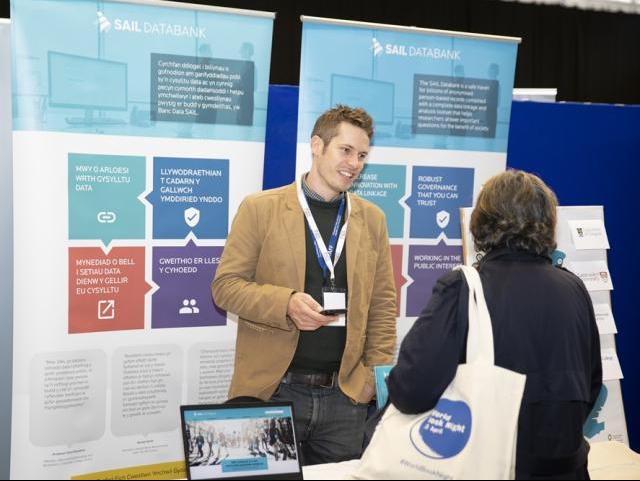
Linked data opportunities to evaluate chronic conditions, evaluating and improving services and people's lives
This webinar is open to all SAIL Databank users anyone interested in hearing further information on the research theme and wider SAIL updates. This is a great opportunity to hear from guest speakers about the research they're undertaking and to get all the latest information and ask questions across the SAIL Databank team and group leads, including infrastructure, analytical services, data resources and documentation, public engagement, business and other developments and updates.
Agenda:
10:00-10:10
Ashley Akbari & Chris Orton – Population Data Science, Swansea University
Welcome and Introductions.
A warm welcome to guests and an outline of today's agenda.
10:10-10:30 - James Bailey - Public Health Wales
Outcome Evaluation Of The All Wales Diabetes Prevention Programme: A Non-Randomised Stepped Wedge Trial
By 2035, around 1 in 11 adults in Wales could develop Type 2 Diabetes if steps aren’t taken to prevent it. This is a serious concern, not just for people’s health but also for the NHS in Wales, which already spends about £500 million a year treating the condition.
To help tackle this, the Welsh Government launched the All-Wales Diabetes Prevention Programme (AWDPP) in 2022. It supports people with prediabetes to make small but important lifestyle changes, like eating healthier and being more active, to reduce the risk of developing type 2 diabetes.
This presentation details the evaluation undertaken on the All Wales Diabetes Prevention Programme from June 2022 to June 2023.
Data collected at primary care via AWDPP delivery has been linked with other routinely collected administrative data within Wales using the Secure Anonymised Information Linkage (SAIL) Databank.
A modified stepped wedge non-randomised trial was chosen to pragmatically align with how the programme was implemented across Wales. This experimental approach enabled a rigorous outcome evaluation of the health intervention in real-world conditions where a traditional randomised controlled trial was not feasible.
10:30-10:50 - Jingwei Gao - Swansea University
Long-term impact of the implementation of liver function test pathways on early detection of liver disease
Chronic liver disease is a growing health challenge, yet it is often diagnosed too late. Using linked healthcare data across Wales, we evaluated the long-term impact of reflex AST testing—a liver function test pathway designed to enable earlier detection. Our study included 78,917 individuals and applied a difference-in-differences analysis to compare trends in early-stage liver disease and cirrhosis diagnoses before and after implementation in two regions. One region showed clear improvements, while the other did not, suggesting potential variation in pathway effectiveness. These findings highlight the potential of linked data to assess real-world interventions and the need for further research into each step of the clinical pathway to optimise future screening strategies and reduce the burden of liver disease.
10:50-11:10 - Helen Daniels - Swansea University
Persistent Pain in Wales: Prevalence and Healthcare Utilisation from a Population-Scale Retrospective Cohort Study
Persistent pain affects the lives of thousands in Wales, reducing quality of life and placing a substantial burden on NHS services. In response, Welsh Government published the Living with Persistent Pain guidance in 2023, recognising it as a national priority. This presentation summarises research conducted by the HCRW Evidence Centre to support NHS Wales leads with planning and decision-making around services, capacity, and the implementation of national policy.
11:10-11:30 - Rhiannon Owen - Swansea University
Health and Care Pathways in the Last Year of Life from Non-sudden Causes
As global populations live longer, there are increasing numbers of people living with multiple long-term conditions, with increasing demand on health and care services, including palliative care and end of life services. Currently, little is known about health and care service utilisation at the end of life in a population with access to universal healthcare (e.g. UK), and/or at a system level, including health and care services, which reflect complex processes. In response to the National Programme for End of Life and Palliative Care in Wales (which is tasked with informing government policy over the next 25 years for palliative and end of life care in Wales), the objective of this work was to examine how individuals interact with health and care services in the last year of life, and whether the rate of health and care service utilisation by setting and type differs for those in receipt of palliative care and by demographic characteristics.
11:30-12:00
Updates from SAIL Databank teams.
All the latest information about SAIL's developments across IT infrastructure, analytical software, data resources, public engagement, business and other developments here at SAIL
The SAIL Databank Showcase Webinar Series is held bi-monthly, and each webinar focuses on a different research and intelligence theme. If you would like the opportunity to present or would like to make a request/suggestion for future themes, please contact: Ashley Akbari or Chris Orton.
This event is being run by the SAIL Databank if you have any questions, please contact the event team.
Free